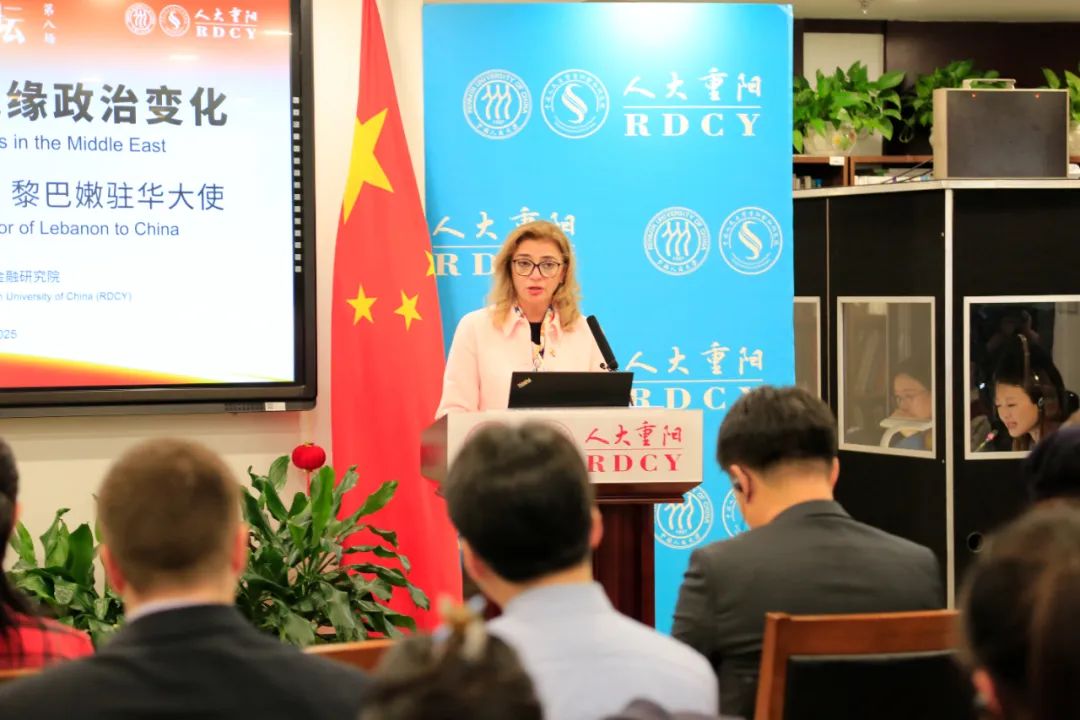Picture
Your Present Location: HOME> PictureAmbassador of Lebanon to China Visits RUC and Shares Insights on the Latest Geopolitical Shifts in the Middle East

On April 2, 2025, Ambassador of Lebanon to China, Milia JABBOUR, visited Renmin University of China (RUC). RUC President Lin Shangli and Vice President Zheng Xinye met with the ambassador. Following the meeting, Ambassador JABBOUR toured the RUC Museum accompanied by Wang Wen, Dean of the Chongyang Institute for Financial Studies at Renmin University of China (RDCY), and delivered a keynote speech at RDCY Forum for Area Studies, Ambassador Forum No.8 titled “Lebanon and the Geopolitical Shifts in the Middle East”. The lecture attracted hundreds of participants, including faculty and students from RUC, corporate representatives, and media personnel. The event was moderated by RDCY Dean Wang Wen.
In her speech, Ambassador Milia JABBOUR highlighted Lebanon’s important role in the Middle East despite its small size, emphasizing its strategic location at the crossroads of the Mediterranean Basin, the Arabian Peninsula, and Europe. She noted how Lebanon’s focal point in geopolitical politics from history has made Lebanon’s unique cultural and political diversity; and how the colonial power has reshaped regional politics and interests, “arbitrary borders drawn by colonial power disregarded ethnic, religious, and tribal affiliations, often sowing the seeds of discord and instability.,” she said, underscoring how such problems like the Israel-Palestine conflict and the Syrian crisis continue to challenge Lebanon’s stability and sovereignty in modern days.
Ambassador Milia JABBOUR also addressed the recent profound geopolitical shifts in the Middle East, characterized by a “power shift to the East”. She noted that the traditional dominance of the United States and the European countries is being redefined by emerging powers. China, now as one of the world’s largest economies, has intensified its engagement in the Middle East through the Belt and Road Initiative (BRI), which has driven Chinese investment and connectivity to the region. China’s diplomatic initiatives to the region, including the Saudi-Iran reconciliation, Palestinian factional reconciliation, and the recent trilateral Beijing Meeting between China, Russia and Iran, aiming to promote regional stability, etc. Also, Russia’s resurgence has also altered geopolitical dynamics, reshaping alliances, interests, and power structures in the Middle East. As China and Russia’s influence grows, the balance of power and international relations will continue to evolve and shape the future trajectory of the region and the global order.
Speaking about Lebanon’s future, Ambassador Milia JABBOUR acknowledged that the country is at a historical juncture. The election of Joseph Aoun as Lebanon’s new president after over two years of a presidential vacuum offers an opportunity to rebuild a viable governance framework. She emphasized the “coexistence of dangers and opportunities” in the Middle East’s transformation: while conflicts like those between Israel and Palestine and between Israel and Arab states remain significant challenges to regional stability, the reshaping of regional order also creates opportunities for constructive engagement, effective diplomacy, multilateral cooperation, and conflict resolution.
Ambassador Milia JABBOUR called for a deep understanding of regional dynamics, lessons from history, and a commitment to multilateralism. Stressing international cooperation, diplomatic means, and respect for national sovereignty are essential for building a more stable, peaceful, and prosperous Middle East. Despite daunting challenges, the pursuit of peace and justice remains critical for the well-being of the region and the world.
During the Q&A session, Ambassador Milia JABBOUR engaged with the audience on issues such as Middle East geopolitical conflicts, religious and cultural diversity, and changes in the global landscape. When asked about Lebanon’s stance amid U.S. hegemony, she highlighted China’s wisdom and pragmatic approach to problem-solving, contrasting it with the U.S. tendency to take sides. “China is a partner that considers the well-being of all”, she said.
Representatives from companies and organizations such as Luzhou Laojiao, Sinopec International Exploration and Production Corporation, China Xinxing Import and Export Co., Ltd, All-China Environment Federation, Zhongqian Capital, and IHang Foundation attended the event.























































































 京公网安备 11010802037854号
京公网安备 11010802037854号





